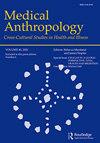The Care of Deeply Significant Insignificant Things: An Ethnographic Study of Palliative Care in Malta.
IF 1.2
3区 社会学
Q2 ANTHROPOLOGY
引用次数: 0
Abstract
In Malta, palliative care is often seen by nurses, policymakers and others as care of doing nothing. In my study, I demonstrate how nurses working in a palliative care unit attend to what, in the Maltese language, are called ċuċati: seemingly trivial acts that, even within palliative care, are often not recognized as legitimate forms of care, yet have a profound effect on patients' well-being. In this article, I highlight a paradoxical relationship between the ċuċati and formal recognition. Formal recognition, while providing a means to legitimization, also risks depersonalizing the ċuċati, potentially undermining nurses' intent to improve patients' well-being.
对具有深刻意义的微不足道事物的关怀:马耳他姑息治疗的民族志研究。
在马耳他,护士、政策制定者和其他人往往将姑息治疗视为什么都不做的护理。在我的研究中,我展示了在姑息治疗病房工作的护士如何处理在马耳他语中被称为ċuċati的事情:看似微不足道的行为,即使在姑息治疗中,也经常不被认为是合法的护理形式,但对患者的福祉有深远的影响。在本文中,我强调了ċuċati和正式承认之间的矛盾关系。正式承认虽然提供了合法化的手段,但也有可能使ċuċati失去人格化,潜在地破坏护士改善患者福祉的意图。
本文章由计算机程序翻译,如有差异,请以英文原文为准。
求助全文
约1分钟内获得全文
求助全文
来源期刊

Medical Anthropology
Multiple-
CiteScore
4.10
自引率
4.30%
发文量
57
期刊介绍:
Medical Anthropology provides a global forum for scholarly articles on the social patterns of ill-health and disease transmission, and experiences of and knowledge about health, illness and wellbeing. These include the nature, organization and movement of peoples, technologies and treatments, and how inequalities pattern access to these. Articles published in the journal showcase the theoretical sophistication, methodological soundness and ethnographic richness of contemporary medical anthropology. Through the publication of empirical articles and editorials, we encourage our authors and readers to engage critically with the key debates of our time. Medical Anthropology invites manuscripts on a wide range of topics, reflecting the diversity and the expanding interests and concerns of researchers in the field.
 求助内容:
求助内容: 应助结果提醒方式:
应助结果提醒方式:


